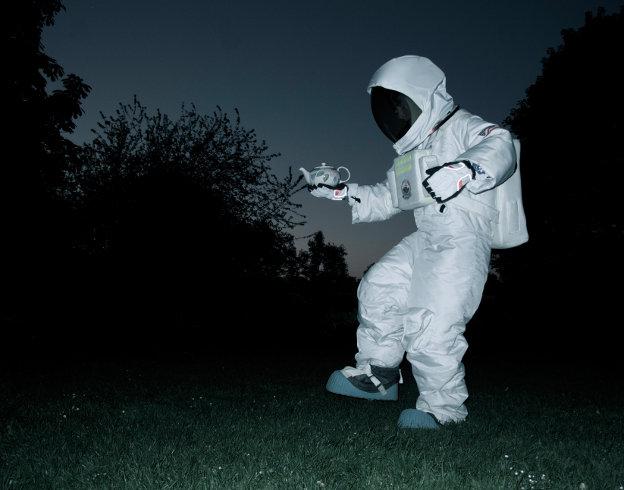Behold Captain Jane Ko and her trusty robot sidekick Stark, going where no woman has gone before, into the land that time forgot. There are fossils and relics and remembrances of things past. There are new discoveries that seem worryingly familiar, forgotten quests, and retrod paths.
Captain Ko is a triptych of short pieces by the ever-resourceful Lecoq trained Dancing Brick company that references and plays upon every single ‘philosophical’ sci-fi film you could care to mention, from Tarkovsky’s Solaristo Kubrick’s 2001: A Space Odyssey; Ridley Scott’s Alien to Duncan Jones’Moon.
Part one is cheery and clownish and has a kind of Star Trek meets Forbidden Planet vibe, our trusty space adventurers clad in Pierre Cardin-inspired Swinging 60s versions of spacewear – duck-egg blue suits and white booties. Using film very nicely as a backdrop – samples of sci-fi classics, countdowns, moonwalk footage – we see our two lost wanderers moving in endless circles as the millennia tick by.
In part two, there’s a sudden switch in mood. Stark disappears, Captain Ko takes off her helmet and jacket, dons a beige cardigan and glasses, and she’s now an old lady. There follows an excruciating fifteen minutes or more as she silently repeats a series of mimed actions from everyday life – reaching to get a cup from the cupboard, pouring a drink, forgetting what she’s doing, starting again… and so it goes on. And on. I learn a day later from someone who managed to get a programme (there were few to be had!) that the whole work was developed from a research process into the effects of Alzheimer’s. But without this knowledge there is no way to understand this scene, nor to appreciate the ‘lost in space’ scenes as a metaphor for dementia. I would also say that there are surely ways to present the notion of mindless, boring repetition without being boringly repetitious. Many audience members had their heads in their hands at this point.
The third part is much stronger – here we are presented with the story of Sergei Krikalev, who holds the honour of being the man who has spent the longest time in space. He was dubbed the last citizen of the USSR, spending ten months aboard the Mir space station from May 1991 to March 1992 as the Soviet Union fell apart, meaning that, although he was of course monitored, no one was too interested in him – there were bigger concerns back home. Thomas Eccleshare drops his Stark persona to become Sergei (and again, without the programme notes I really didn’t understand this at the time) and the other half of Dancing Brick, Valentina Ceschi, keeps him under surveillance with a very nice use of live feed video that cleverly gives us the impression of Sergei in zero gravity, drifting aimlessly you could say. I’m very taken with this narrative of the cosmonaut abandoned whilst life on earth goes off in all sorts of new directions – and of course being left drifting in space whilst the world moves on is a pretty good metaphor for the terrors of old age, so now I’m aware of this over-arching Alzheimer’s theme things make more sense than they did whilst watching the show.
Ultimately, I felt that although there were very many marvellous moments, what I was watching was a series of provocations – ideas towards a show rather than the show itself. Also to say that if, in a piece of predominantly physical and visual theatre, we need programme notes to understand the content of the show, then something has gone wrong.
There is work to be done, but hopefully there is a good show in here waiting to emerge eyes blinking into the daylight.


